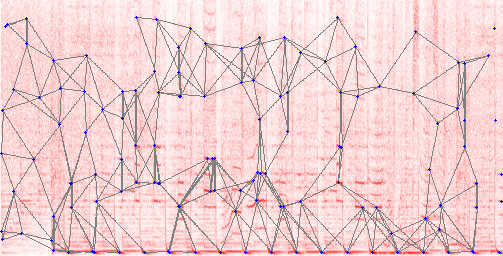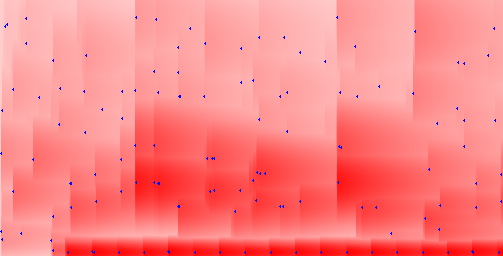This module is a duplex stream (instance of stream.Transform) that converts a PCM audio signal into a series of audio fingerprints. It works with audio tracks as well as with unlimited audio streams, e.g. broadcast radio.
The acoustic fingerprinting technique used here is the landmark algorithm, as described in the Shazam 2003 paper.
The implementation in codegen_landmark.js has been inspired by the MATLAB routine of D. Ellis "Robust Landmark-Based Audio Fingerprinting" (2009). One significant difference with Ellis' implementation is that this module can handle unlimited audio streams, e.g. radio, and not only finished audio tracks.
In a nutshell,
- a spectrogram is computed from the audio signal
- significant peaks are chosen in this time-frequency map. a latency of 500ms is used to determine if a peak is not followed by a bigger peak.
- fingerprints are computed by linking peaks with
dt,f1andf2, ready to be inserted in a database or to be compared with other fingerprints.
In the background, about 12s of musical content is represented as a spectrogram (top frequency is about 5kHz). The blue marks are the chosen spectrogram peaks. Grey lines are peaks pairs that each lead to a fingerprint.
Given the same audio, this figure shows the same peaks and the internal forward threshold that prevent peaks from being too close in time and frequency. The backward threshold selection is not represented here.
npm installThe algorithm is in codegen_landmark.js.
A demo usage is proposed in codegen_demo.js.
var decoder = require('child_process').spawn('ffmpeg', [
'-i', 'pipe:0',
'-acodec', 'pcm_s16le',
'-ar', 11025,
'-ac', 1,
'-f', 'wav',
'-v', 'fatal',
'pipe:1'
], { stdio: ['pipe', 'pipe', process.stderr] });
process.stdin.pipe(decoder.stdin);
var Codegen = require("./codegen_landmark.js");
var fingerprinter = new Codegen();
decoder.stdout.pipe(fingerprinter);
fingerprinter.on("data", function(data) {
for (var i=0; i<data.tcodes.length; i++) {
console.log("time=" + data.tcodes[i] + " fingerprint=" + data.hcodes[i]);
}
});and then we pipe audio data
curl http://radiofg.impek.com/fg | nodejs codegen_demo.jsSee LICENSE file.

